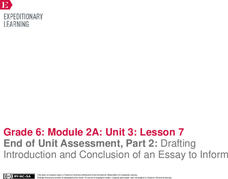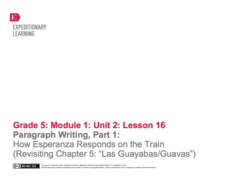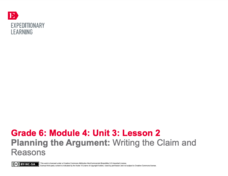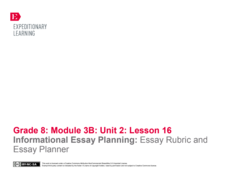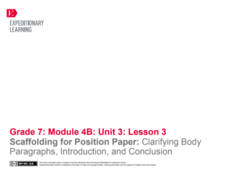EngageNY
End of Unit Assessment, Part 2: Drafting Introduction and Conclusion of an Essay to Inform
A powerful introduction and conclusion can really pack a punch. Using the resource, scholars first read and discuss a model essay. Then, as part of the end of unit assessment, they draft the introductory and concluding paragraphs of...
EngageNY
Grade 12 ELA Module 1, Unit 2, Lesson 6
The final lesson plan in this narrative writing unit asks class members to craft a multi-paragraph essay reflecting on the structural elements Leslie Marmon Silko employs in her "Yellow Woman and a Beauty of the Spirit."
Anti-Defamation League
Lonnie Chavis of 'This Is Us' Writes about Racism
Scholars read and discuss an essay by 12-year-old actor Lonnie Chaves about racism, paying close attention to how racism presents itself in interpersonal and institutional ways. Learners reflect on how they experience or witness racism...
EngageNY
Grade 12 ELA Module 1: Unit 1, Lesson 14
As a mid-unit assessment, individuals craft an in-class, formal essay response to a prompt that asks them to use textual evidence to identify Haley's purpose, as well as analyze how the structure, style, and content contribute to the...
Curated OER
Lesson: Urs Fischer: Your Choice: Reality or Illusion?
Young analysts write a comparative essay, but about what? They compose a paper based on several critical discussion about reality and illusion, and how both are blurred in art. They analyze several theatre pieces that exemplify Brechtian...
Curated OER
Wrap it up!
Sometimes the conclusion of an essay can be the most important part. Whether your writers are ending with a proposition, lesson learned, or persuasive argument, teach them how to "end with a bang" with this helpful PowerPoint! This...
EngageNY
Paragraph Writing, Part 1: How Esperanza Responds on the Train (Revisiting Chapter 5: "Las Guayabas/Guavas")
When your class members have completed the novel Esperanza Rising, they will be ready to write an expository essay on how Esperanza responds to events and what this says about her character. Set your pupils up for success by...
EngageNY
Planning the Argument: Writing the Claim and Reasons
Step up! Using the resource, scholars discover the six steps to writing an effective position paper. Next, they work on a graphic organizer to begin planning their argument-based essays.
EngageNY
Grade 12 ELA Module 1: Unit 1, Lesson 24
Today's discussion of The Autobiography of Malcolm X focuses on the precise words, the telling phrases, and the sensory details Haley uses to enliven his story. Writers then work to incorporate these same techniques in the draft of their...
Star Wars in the Classroom
"Shakespeare and Star Wars": Lesson Plan Day 15
To conclude the study of the play, William Shakespeare's Star Wars: Verily, A New Hope, class members craft an in-class essay comparing Doescher's adaptation to George Lucas's film, Star Wars: A New Hope.
EngageNY
Informational Essay Planning: Essay Rubric and Essay Planner
Class members dig into the expectations for the end-of-unit assessment for A Mighty Long Way by studying the rubric. The Rubric Criteria strips help pairs of readers look more closely at specific rubric points. They share ideas with the...
EngageNY
End of Unit 2 Assessment, Part Two: Final Draft of Analytical Essay
What's one way to make a good essay great? Revise! Scholars revise their drafts from a previous lesson plan to help write their final polished analytical essays about the universal refugee experience. They also practice properly citing...
EngageNY
End of Unit 2 Assessment: Final Draft of Literary Argument Essay
Take the last step in writing a literary argument essay using Bud, Not Buddy by Christopher Paul Curtis in an activity focused on feedback. Using the stars and steps revision method, pupils consider teacher and peer feedback to revise...
EngageNY
Grade 11 ELA Module 1: Unit 2, Lesson 10
To write an essay or not to write an essay—that is the question! Scholars complete a mid-unit assessment based on their study of Hamlet. They write essays analyzing how Shakespeare develops Hamlet's character about other characters.
EngageNY
End of Unit 2 Assessment, Part 2: Revise Essay Drafts
Time to revise! Scholars revise their argument essays based on Shakespeare's A Midsummer Night's Dream using feedback from their teacher and peers. They begin their revisions after reviewing a mini-lesson on proper writing conventions.
EngageNY
Writing an Argument Essay: Evaluating the Model and Crafting a Claim
Pupils prepare to write argumentative essays based on Shakespeare's A Midsummer Night's Dream. They begin weighing evidence and crafting claims for their writing about control.
EngageNY
End of Unit 2 Assessment, Part 1:Drafting the Argument Essay
An informative resource instructs pupils on how to write their essay drafts about the theme of control in Shakespeare's A Midsummer Night's Dream. Next, scholars complete an Exit Ticket, listing their three favorite characters from the...
EngageNY
Scaffolding for Position Paper: Clarifying Body Paragraphs, Introduction, and Conclusion
Let's have a talk. Scholars talk through the body paragraphs of their Sustainable Water Management position paper with peers. They take turns explaining their work to one another. They then begin to work independently on the introduction...
EngageNY
End of Unit 2 Assessment, Part 1b: Writing Introduction and Conclusion
Writers continue looking at the rubric for their A Long Walk to Water essays. This time, they analyze the demands for the introduction and conclusion paragraphs. Pupils compare the rubric to the opening and closing of the model...
EngageNY
End of Unit 1, Assessment, Part 2: Revise Essay Drafts
As a culminating unit activity, pupils revise their argumentative essays based on the novel Lyddie by Katherine Paterson. Paying careful attention to grammar, punctuation, and vocabulary, they incorporate teacher feedback to revise and...
EngageNY
Grade 10 ELA Module 2: Unit 1, Lesson 10
Scholars review the previous nine lessons of analysis of King's "Letter from Birmingham Jail" and use their work to create a formal essay responding to a writing prompt about the purpose of the work. This mid-unit assessment is a quick...
EngageNY
Planning the Introductory and Concluding Paragraphs of the End of Unit Assessment Essay
Preparation is the key to success! Using the guiding resource, scholars plan their end-of-unit analytical essays' introductory and concluding paragraphs based on their reading of Inside Out & Back Again. To prepare, they complete a...
EngageNY
Grade 10 ELA Module 4, Unit 2, Lesson 22
The Witches, Lady Macbeth, or Macbeth himself: who is the culprit? Using the resource, pupils craft multi-paragraph essays to present arguments about which character is responsible for the tragedy in Shakespeare's Macbeth. Additionally,...
EngageNY
Grade 10 ELA Module 4: Unit 2, Lesson 8
Shakespeare's Macbeth has something for everyone. Scholars complete a mid-unit assessment. They craft multi-paragraph essays to analyze how the author's structural choices create tension and suspense in the play's first two acts.


